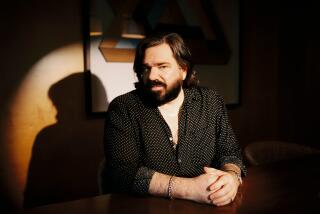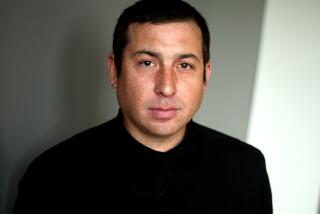Irish writer Kevin Barry tries ‘to hear the music’ of a good tale
- Share via
Kevin Barry’s home was built in the 1840s to house the Royal Irish Constabulary, the country’s police force until the Irish War of Independence. The barracks sits at the edge of Lake Arrow in County Sligo and was constructed to withstand the cold winters of Western Ireland.
“It’s a great place to live eight months out of the year,” Barry says as he welcomes me inside, “but in January and February it’s pretty dark and damp and bleak.”
At the back of the house sits a small, one-room structure Barry refers to as “the shed,” and for the last 12 years this is where he’s written the stories, screenplays and novels that have earned him international acclaim. His most recent novel, “Night Boat to Tangier,” was named to the longlist for the 2019 Booker Prize.
The novel was inspired by Barry’s many trips to Spain during the coldest months of the year. One trip took him across the Strait of Gibraltar to Tangier. He stayed at the Hotel El Muniria, where William S. Burroughs famously wrote “Naked Lunch.”
It wasn’t Tangier that left an impression on Barry but the Spanish port city of Algeciras, particularly the ferry terminal. “The first time I was there, the Civil Guard, the most inaptly named police on the planet, were beating up some rotten kid with the butt of a rifle, and everyone was just drifting by and going about their business.”
This incident sowed the seeds of “Night Boat to Tangier.”
“No matter what I’m writing, whether it’s a short story or a novel, it almost always starts with a place. It’s the atmosphere the place gives off, the vibration you get off the place, that’s usually what creates the desire to write something in response to it.”
Whether he’s imagining an invented city in Ireland’s dystopian future, which is the case in “City of Bohane,” or taking John Lennon on a vision quest to a tiny island in Clew Bay, as he did in “Beatlebone,” Barry’s settings feature prominently in his work.
“Night Boat to Tangier” takes place over a 24-hour period in the terminal building at Algeciras, where a pair of “fading gangsters from Cork City,” Charlie Redmond and Maurice Hearne, wait for Charlie’s missing daughter, Dilly, to pass through.
“You can’t have two Irishmen waiting for something in a story without people going ‘Beckett!’”
But the similarities to Vladimir and Estragon, the protagonists of Samuel Beckett’s play “Waiting for Godot,” end there. In fact, Barry was reading a lot of Harold Pinter plays, particularly “The Birthday Party” and “The Caretaker,” when he began work on the novel.
“The two characters were kinda hanging around for a while in my shed,” Barry says of Maurice and Charlie. They would muscle their way into a short story and immediately take over. Eventually I realized, ‘Ah, these two, I’ve got to give them their own thing.’”
Once Barry sat Maurice and Charlie down in the terminal building at Algeciras and got them talking, the novel took off. “What distinguishes the better characters,” Barry believes, “are they’re really annoying. I can hear them all the time.”
Maurice and Charlie have known each other their whole lives, and the story of their friendship, partnership in crime, dangerous disagreements and undying loyalty to each other is rendered through a series of flashbacks set in cities scattered about Southern Spain and the West of Ireland. But it’s the clever wit and cruel charm of these desperate men that make the book sing.
“It’s built on talk,” says Barry, who turned 50 in June. “It’s built on dialogue. One of the interesting things about Irish people is talk. We love the sounds of our own voices. We talk a lot and say very little. It’s what’s going on under the surface of the talk is what’s interesting.”
But the talk is always interesting in a Kevin Barry novel. The dialogue is more than a vehicle for expressing information — it establishes atmosphere and communicates a mood. “I think every good story or novel has its own kind of tune or a melody, and as a writer what you’re doing is trying to hear the music of it,” he says.
Ireland’s writers have been making a great deal of music lately, from 2018 Booker Prize winner Anna Burns to breakout novelist Sally Rooney, to prose stylists as diverse as David Hayden, June Caldwell and Mike McCormack. Barry believes the emergence of independent literary presses in the last 20 years has helped foster a new wave of Irish writing.
Still it’s surprising that so many writers come from such a small place. “I always say it’s the weather,” Barry says. “It’s raining 300 days of the year. Those kinds of conditions make for an island full of fabulists.”
Ruland is currently working on a book with the L.A. punk rock band Bad Religion.
More to Read
Sign up for our Book Club newsletter
Get the latest news, events and more from the Los Angeles Times Book Club, and help us get L.A. reading and talking.
You may occasionally receive promotional content from the Los Angeles Times.








